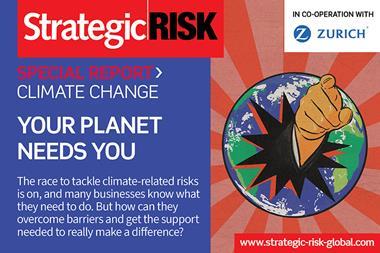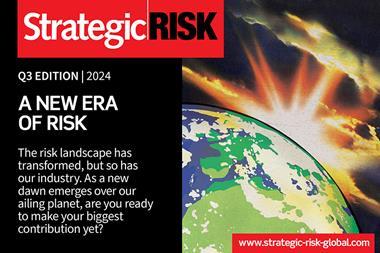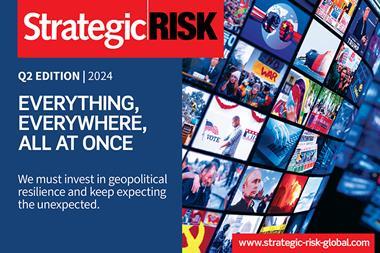As economies restart after the COVID-crisis, there is an opportunity to embed sustainability into the recovery, argues Zurich’s John Scott
On 19 May, the World Economic Forum launched its COVID-19 Risks Outlook, in partnership with Marsh & McLennan and Zurich Insurance Group.
As economies restart, there is an opportunity to embed greater societal equality and sustainability into the recovery, said the report.
StrategicRISK spoke to John Scott, head of sustainability risk at Zurich, to find out more about the impact of the COVID-crisis on sustainability and climate change-related risks. He noted that two-thirds of respondents had identified a “prolonged global recession” as a top concern for business and acknowledged a balanced needed to be struck between the need to maintain healthy populations as well as healthy economies.
“The key word is interconnectivity between these global risks. As we’ve tried to deal with the healthcare crisis and reduce transmission we’ve shut economies to try and keep people at home and to keep them safe. To flatten the curve and protect our public healthcare systems. It’s been very important to do that but the economic consequences are really serious.”
“The fiscal policies have protected the economies put on hold, but we can’t keep them on hold indefinitely and this is the big challenge - managing the dichotomy between health and the economy. It’s neither one or the other, it’s got to be both.”
Fight or flight response to COVID
Noting the rapid response to the coronavirus pandemic, he said humans were hard-wired with a ’fight or flight’ response when an existential crisis is an immediate possibility. For a challenge such as climate change, where the impact takes a long time to unfold, the response is different.
“We’re very good at running up the tree when the lion runs into the campsite, but we’re not as good at dealing with things that happen slowly, and climate change is definitely one of those. So right now we’re in this situation where we’re distracted by dealing with the very important challenges of the healthcare crisis and the economic crisis, but these long-term global risks have not gone away - they are still there.”
“What’s intriguing is we’re seeing right now significant reductions in emissions due to a reduction in travel and industrial activity,” he continued. “If you go outside, everyone seems to comment on how blue the sky is and how quiet everything is. There are not many cars or aeroplanes and people are reconnecting with nature. And realising this is how it could be.”
Whether or not momentum can be sustained around some of these changed behaviours, brought on by the COVID-crisis, is ultimately down to how governments and businesses respond, thinks Scott. This could make a big difference in how sustainability risk is tackled going forward.
“We have seen changing attitudes towards working practices, travelling, meeting and consumption more broadly and with consumer behaviour changing. All that creates business opportunities to really create and work out a more sustainable business model for all companies in all sectors.”
These behaviours, along with global movements - such as the activities of Greta Thunberg’s school strike for climate and Extinction Rebellion - that have increased public awareness could help ensure a “clean green recovery”. Scott notes the EU’s ‘green’ recovery plan intends to accelerate its shift to a low-carbon economy.
“It would be a tragedy to restart the economy as it was without taking the opportunity of advancing plans to restart in a different way, or at least set us on the path of decarbonisation.”
“We’re all sensitive to it and once we’re over this and recovering from this COVID-19 crisis, people will have an appetite to see a cleaner, greener and more sustainable recovery that’s really focused on communities and people.”
Fighting for survival
Risk managers should consider both the short and long term issues raised in the WEF report, said Scott.
“In the short term there are the clear operational requirements to manage the healthcare crisis, protect our employees and our customers and society more broadly, but having this opportunity to get back to restarting the economy as well. So its managing those trade-offs.”
The fact that many companies came into the crisis in a weakened position will clearly be an immediate priority for many risk professionals, he acknowledged. The very low interest rate environment that has characterised the past decade following the Global Financial Crisis means both governments and the private sector have built a lot of debt onto their balance sheet, he explained.
“Those companies with weaker balance sheets generally don’t come out of a recession very well or don’t come out at all. That’s both a threat and opportunity for companies, working out to survive and finding the silver lining.”
“As risk managers we have access to all sorts of skillsets, modelling scenario analysis, especially in the financial services sector,” he continued. “We can use those skills to understand economic scenarios and to apply them to COVID-19 using a range of scenarios to explore how the future will develop and what our responses should be.”
Scott is not convinced companies’ crisis management teams are best placed to think about future opportunities. “Really you need to have a second team. It’s too much for any one team to try and think about the future when you’re utterly focused on trying to sort out what’s happening today or tomorrow.”
Restart risks are another issue for organisations, particularly those within manufacturing industries. “From an operational risk management point of view, many companies have put factories or other physical assets on hold,” said Scott. “They are either idle or in some cases they have been repurposed to manufacture other products, such as PPE. What are the plans to get them get restarted with their normal business activities again?”
And there is a human side to consider. ”How do you manage people who have been out of work for some time?” asked Scott. “How do you look after them? Have you supported them and can you then bring them back into the business and into the workplace easily and quickly in a way that supports them and supports the business too? All those things are the things risk managers have to be thinking about right now.”




















No comments yet